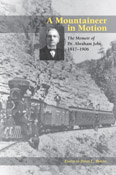A Mountaineer in Motion
The Memoir of Dr. Abraham Jobe, 1817-1906

- Author(s): Hsiung, David C.
- Series:
- Imprint: Univ Tennessee Press
- Publication Date: 2009-10-16
- Status: Active
- Available in Hardcover - Cloth: Price $37.95 | Buy Now
This compelling autobiography of a nineteenth-century Tennessee physician, entrepreneur, and civil servant provides an intriguing look at one professional man’s life in pre– and post–Civil War Appalachia and stands as an invaluable chronicle of southern history.
Born in upper East Tennessee in 1817, Dr. Abraham Jobe moved at an early age to Cades Cove, Tennessee, with his family. His description of that area at the very beginning of the community offers a unique perspective on frontier life. His father then moved the family to newly-opened Cherokee lands in Georgia and later to Creek lands in Alabama, where Jobe learned to speak the Creek language. Dr. Jobe writes extensively on these Native American tribes, offering a window into the deeply-rooted ethnocentricity of American pioneers in what was then called the Old Southwest.
Beginning in the 1840s, Jobe practiced medicine in upper East Tennessee and in northwestern North Carolina. He recounts many of his medical cases, some quite harrowing, and in the process illuminates both the role of the physician in Appalachian society and the state of scientific thinking at this time.
During the Civil War, Jobe was a Unionist and witnessed such brutal fighting in East Tennessee that he was forced to go into hiding and eventually flee the region. Jobe discusses this experience and comments on the effectiveness of Reconstruction governments and the entry of African Americans into state legislatures. After the Civil War, his friendship with Andrew Johnson resulted in an appointment as a special agent in the U.S. Postal Service.
In 1868, Jobe led a diplomatic mission to the Chippewa Indian reservations in northern Minnesota. He provides an intimate look at frontier conditions, at Native Americans coping with internal divisions, and at federal policies seeking to “civilize” them.
Upon his return to southern Appalachia, Jobe started two manufacturing businesses, reflecting the entrepreneurial activity that characterized both the New South specifically and the nineteenth-century generally.
Exhaustively annotated, A Mountaineer in Motion offers an engaging and candid record of what a nineteenth-century man of the professional class actually thought about politics, social relations, the economy, the Civil War, Native Americans, and Reconstruction.
David C. Hsiung is the Charles R. and Shirley A. Knox Professor of History at Juniata College. He is the author of Two Worlds in the Tennessee Mountains: Exploring the Origins of Appalachian Stereotypes and has contributed to High Mountains Rising: Appalachia in Time and Place and the Encyclopedia of Appalachia.
He has published articles in The New England Quarterly, Teaching History, Pennsylvania History, Appalachian Journal, and Journal of the Appalachian Studies Association.
